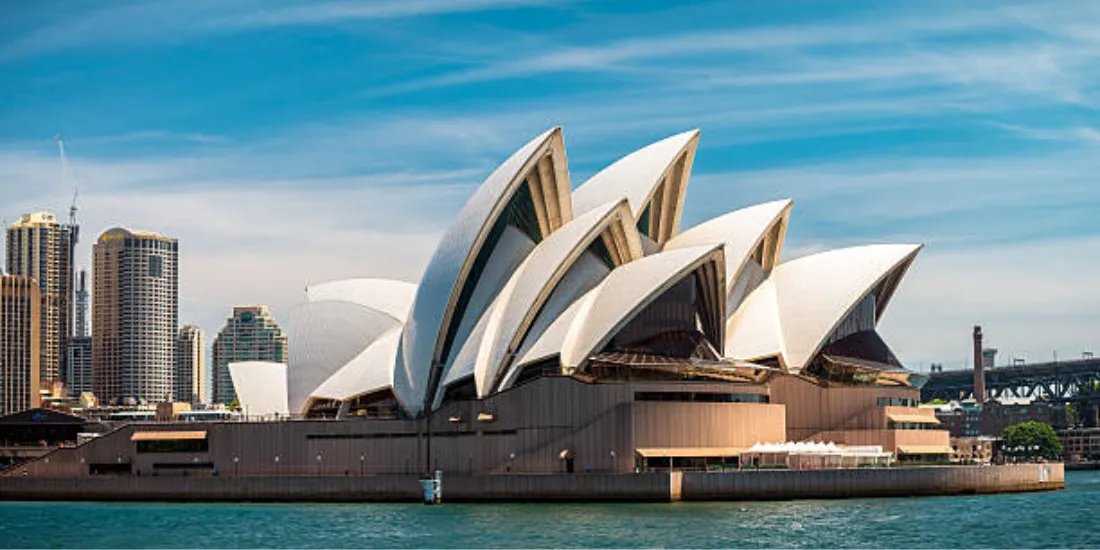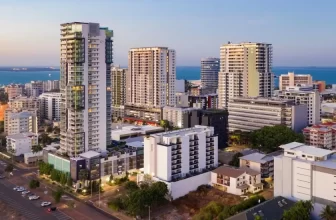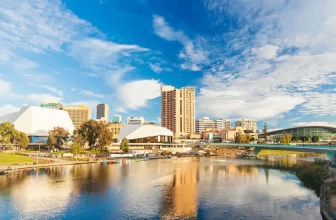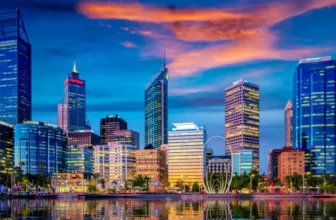
The First Time I Landed in Sydney…
The first thing that hits you when you arrive in Sydney isn’t the weather-it’s the scent of eucalyptus in the air, mixing with car exhaust and the salty breeze rolling in from the coast. You step outside the terminal at Kingsford Smith Airport and it’s like stepping into a sun-drenched city that’s… buzzing. There are people everywhere. Students staring at Google Maps. Backpackers talking in five different languages. Buses honking. Birds screaming (you’ll meet the ibis soon-good luck).
I remember clutching my rental Wi-Fi device like it was sacred, trying to find the right platform at Central Station. It was my first time abroad. I had no idea how the Opal card worked (turns out you just tap on/off-easy), and my suitcase was already falling apart.
But beneath the chaos, there was this electric feeling: I was finally here, about to start my journey studying abroad in Sydney. It was unfamiliar. Awkward. But exciting in a big way.
Why Study in Sydney in 2026?
Here’s the thing-there are plenty of places to study abroad. But Studying in Sydney in 2026? You’re hitting a sweet spot.
Australia is actively recruiting international students again, and Sydney is leading the charge. Since 2024, the government’s rolled out a ton of updates just to make things easier:
- The maximum working hours cap was lifted temporarily in most sectors, then adjusted again in 2025 to a new steady limit of 48 hours per fortnight during studies (with breaks unrestricted).
- Post-study work rights are extended-STEM, nursing, and IT grads now get up to 4 years to stay after graduating (per Temporary Graduate visa updates).
- National skills shortages in health, education, engineering, and digital technologies mean your degree can actually lead to a job in Australia-major change from even 5 years ago.
And then there’s Sydney itself. It’s not just about the uni name on your degree. You’ll:
- Meet people from literally everywhere (I had classmates from South Korea, Kenya, Ireland, and Brazil-just in one class).
- Learn independence real quick.
- Be surrounded by beaches, hikes, music gigs, food trucks, and weekend markets (seriously, don’t miss the Glebe Markets).
- Find opportunities-not just jobs, but ideas, connections, new ways to think.
So yeah, academically and personally? 2026 is a very good year to be thinking about a study guide in Sydney.
Why Is Sydney Important for International Students?
Sydney isn’t just the biggest city in Australia-it’s the most student-friendly one too. And I don’t mean that in a brochure way.
A Few Numbers:
- Over 145,000 international students call Sydney home every year.
- More than 39% of higher-ed students in Sydney are international.
- Universities here have dedicated global student support teams, internship hubs, and international societies.
Most courses are CRICOS-registered, meaning they’re not just approved for overseas education, they’re also linked to migration pathways. That matters if you’re thinking long-term.
Support-wise? Sydney’s solid.
- NSW has the NSW International Student Hub in the CBD, offering career support, legal aid, and even free events to help you meet people.
- Every uni has a campus life office, mental health support (some offer 24/7 calls), and language tutoring if English isn’t your first language.
Culturally, Sydney’s as mixed as it gets. You’ll hear 5+ languages on a walk through Haymarket. And no one cares where you’re from-they just want to know where to get good dumplings and what you’re studying.
Top Universities and Colleges in Sydney
Okay, here’s your honest, non-marketing look at the best universities in Sydney for international students.
1. University of Sydney (USYD)
- Rank: Top 20 globally (QS 2025)
- Best For: Medicine, law, vet science, politics
- Tuition Range: AUD 40,000–55,000/year
- Student Culture: Rich in history, fancy architecture, serious academia
- Downside: Competitive and traditional-don’t expect hand-holding
- Location: Inner-West (Camperdown)
2. University of New South Wales (UNSW)
- Rank: #27 globally
- Great For: Engineering, economics, climate science, data
- Tuition: AUD 38,000–52,000/year
- Vibe: Ambitious, diverse, forward-thinking
- Major Benefit: Connected deeply with innovation & startups
- Location: Kensington (close to Coogee Beach)
3. UTS (University of Technology Sydney)
- Rank: Around 90 worldwide
- Strengths: Design, software engineering, media
- Tuition: AUD 30,000–42,000/year
- Cool Factor: Creative degrees + city location = active brain hub
- Campus Feel: Modern, central, urban
- Location: Right next to Central Station
4. Macquarie University
- Rank: Top 200
- Specialties: Linguistics, finance, psychology
- Fees: AUD 30,000–40,000/year
- Campus: Green, chill, more space to breathe
- Location: North Ryde (suburban)
5. Western Sydney University
- Known For: Social work, nursing, education
- Fees: AUD 25,000–34,000
- Student Support: Very international-friendly, strong entry programs
- Location: Multiple suburban campuses
Top Student Accommodation in Sydney
Renting in Sydney is expensive. No sugar-coating that. But here’s what actually works:
1. Scape Student Living
- Cost: AUD 450–550/week (shared studio or well-designed single)
- Includes: High-speed internet, events, gym
- Close to: UTS and Sydney Uni
- Not Ideal If: You hate noise-lots of social events
2. University Village (USYD / UNSW)
- Cost: AUD 300–420/week
- Style: Dorms or shared apartments
- Pros: You’re 5 minutes from lectures
- Downside: Shared kitchen often = weird food smells and dirty sinks
3. Urbanest Darling House
- Cost: AUD 380–490/week
- Buzz: Modern, central, social
- Pro Tip: Best booked early-waiting lists can be long
4. Shared Housing (via Flatmates.com.au, Gumtree)
- Cost: AUD 220–350/week
- Good If: You’re independent and want flexibility
- Caution: Always inspect or ask for video calls. Scams exist.
Best Student Areas in Sydney (Honest Breakdown)
Here’s the lowdown on where real students actually live:
Newtown
- Distance: 10 min walk to USYD
- Rent: AUD 300–350/week
- Vibe: Hipster, vintage stores, music, $10 ramen
- Warning: Can get noisy on weekends
Kensington
- Distance: Right next to UNSW
- Rent: AUD 300–370/week
- Style: Student-friendly, quiet
- Catch: Commute to city is longer
Ultimo & Haymarket
- Perfect For: UTS, TAFE students
- Rent: AUD 350–450/week
- Pros: Central. Eat anything from Thai to Ethiopian within 2 blocks.
- Cons: Tight spaces
Parramatta
- Best For: Western Sydney Uni
- Rent: AUD 250–320/week
- Scene: Big town energy-restaurants, riverside walks
- Downside: 30–40 mins to CBD by train
Cost of Living in Sydney (2026)
Let’s talk numbers-per month, in AUD:
| Category | Budget Range |
| Accommodation | $900 – $1,600 |
| Food and Groceries | $250 – $400 |
| Transport (Opal Card) | $90 (student cap) |
| Phone/Internet | $30 – $60 |
| Social Life/Events | $100 – $250 |
| Health/Insurance (OSHC) | $50 – $60 |
| Study Materials | $50 – $100 |
| Total Est. Monthly | $1,500 – $2,500 |
Money-saving hacks:
- Get the student Opal card asap
- Aldi, not Woolies (trust me)
- Join campus clubs for free meals/events
- Use Facebook Marketplace for used books and appliances
Scholarships and Financial Aid
Yes, scholarships exist-but you’ve gotta dig and apply early.
Government Scholarships:
- Australia Awards Scholarships (full ride)
- Destination Australia Scholarships (for regional unis)
Top Uni Scholarships:
- UNSW International Scholarships
- USYD Sydney Scholars
- Macquarie Vice-Chancellor’s International Awards
Timeline Tips:
- Most close by November–December 2025
- Highlight impact, not just grades
- Email professors for references early. Don’t ghost them till the last minute.
Application Process – Step-by-Step Guide
- Shortlist Unis and Courses – Start May–August 2025
- Language Tests – Take IELTS/TOEFL before September
- Write SOP / Get Documents Ready
- Apply to Unis (Aug–Dec 2025)
- Receive Offer + Accept (within a month)
- Apply for Visa Subclass 500
- Book Flights/Accommodation
- Pre-Departure Orientation – Jan 2026
Student Visa and Work Regulations
Visa Subclass 500 – Basics:
- Proof of enrollment (COE), funds, health insurance, GTE statement
- Processing Time: ~4–6 weeks
- Work Limit: 48 hours/fortnight while studying; unlimited during breaks
- Stay Back: Up to 4 years (dependent on degree & field)
Recent shift: More scrutiny on funds & statements-be honest and clear.
Getting Around Sydney – Transport Made Easy
- Opal Card (Student): Discounted weekly cap of ~$30
- Modes: Train, Light Rail, Bus, Ferry (!)
- Best Apps: TripView, TransportNSW, Opal Travel
- Pro Tip: Top up your card online-no fumbling with coins
Student Life, Food & Culture
A typical day? Uni in the morning, $12 pho for lunch, library till 6, Coogee sunset, then Netflix with housemates.
Food scene: Korean BBQ in Strathfield, biryani at Harris Park, bubble tea everywhere. And yes-go to “Eat Street” in Parramatta.
Unexpected perks:
- Student societies throw parties and career events
- Coffee culture is massive: try Mecca, Reuben Hills, Edition Coffee Roasters
- Public uni events are often free-film nights, festivals, career expos
Career & Internships in Sydney
- Big Industries: Finance, health sciences, AI, green tech, digital media
- Internships? Common. Some are unpaid. Check fairwork.gov.au for regs.
- How to Find Jobs:
- LinkedIn and Seek
- Uni portals
- Networking events and international student fairs
Short-Term Study Abroad Options
Sydney unis offer:
- Winter and Summer Schools: 2–6 weeks
- Exchange Programs
- Short Certs & Workshops (AI, Design, Language)
Costs? ~AUD 2,000–6,500 depending on uni and course type.
Best for those wanting a taste of Sydney life before committing long-term.
Public vs Private Universities Comparison
| Feature | Public Uni | Private College |
| Cost | Lower overall fees | Higher per course/unit |
| Ranking | Usually higher | Varies |
| Class Size | Larger | Smaller, personal |
| Scholarships | More available | Limited |
| Flexibility | Depends | Often course-specific |
Final Thoughts – Why Sydney?
Look-Sydney isn’t perfect. It’s expensive. The weather in summer can melt your face. And housing is a battlefield.
But if you want academic growth, global exposure, amazing beaches, and real career opportunities?
Then yes-Sydney is 100% worth it.
Quick tips for Year One:
- Join at least 1 club. Even if it’s the anime society.
- Visit the uni careers centre early
- Be ready for culture adjustment-then embrace it
- Always keep a reusable water bottle (hydration + sustainability)
- Say yes to new things (except rooming with 6 strangers, maybe)
FAQs: Studying in Sydney for 2026
Yes. Budget around AUD 1,800–2,500/month realistically.
Yes-48 hours/fortnight during semester, unlimited in breaks.
Nope. Just meet the IELTS/TOEFL requirement. Everyone’s learning.
Safest in Australia alongside Melbourne. Standard big-city awareness applies.
Yes. The post-study work visa gives you up to 4 years depending on your degree.
Yes. Apply early-Oct to Dec 2025 is peak time.
Start by mid-2025, finish your apps by Dec 2025, visa done by Jan–Feb 2026.
Final Words? You’ve got this. Planning your overseas education in Sydney is a bold step-but trust me, it’s one that can totally change your life.
(If you need help with choosing your university, writing your SOP, or applying for scholarships, sign up to [Studyabroadadvice.com]-real support from real people who’ve done this already.)






